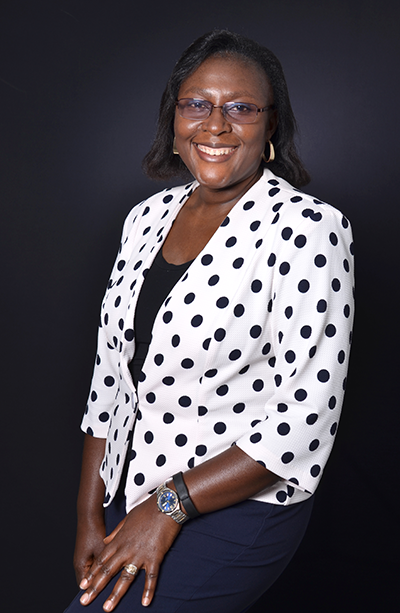
 The earth beneath our feet has many surprising qualities, and a Unisa scientist has covered vast amounts of ground, from Nigeria and Central Africa to South Africa, in search of some of them.
The earth beneath our feet has many surprising qualities, and a Unisa scientist has covered vast amounts of ground, from Nigeria and Central Africa to South Africa, in search of some of them.
Prof Veronica Ngole-Jeme of the College of Agricultural and Environmental Sciences (CAES), based at Unisa’s Science Campus, has been fascinated with soil—particularly soil contamination and remediation—ever since she visited a landfill in Nigeria as an undergraduate student. “I looked around and saw how the waste was being managed and wondered what effect it could have on the quality of soil.”
Therefore, after completing her BSc in Zoology, she gravitated towards the Environmental Sciences, with an emphasis on soil quality and waste management, completing her master’s and then her PhD in the field.
Ngole-Jeme received her first NRF rating, Y2, while a senior Research Fellow at Walter Sisulu University in the Eastern Cape in 2011. She then moved to the North-West University before joining Unisa in May 2016. She was re-rated successfully—this time as a C3 researcher—in January this year.
“NRF rating is important for the institution and the researcher,” says Ngole-Jeme. “It boosts the organisation’s image and reflects positively on the calibre of staff in the institution and the level of research it generates. On an individual level, it is a professional accomplishment that fewer than 20% of researchers in South Africa have attained. Rating boosts your confidence in research and also grants you access to research funding for the next five years after your rating.”
Much of her work involves investigating the extent to which soils under different land uses are contaminated with heavy metals, and exploring ways to remediate soil contaminated by heavy metals.
Her current research is on the impact of incidental bush fires on the sorption properties of heavy metal-contaminated soils around mine tailings waste. “Soil has a natural ability to bind and hold contaminants so that they do not migrate to surrounding environments or become available to plants for uptake. Fire can affect this ability by changing the chemical and biological properties of soil. ” She has chosen to focus on the effects of fire in a mining environment specifically because these environments are usually laden with various heavy metals and metalloids.
In other research, she and some of her postgraduate students are looking at ways to use organic waste such as lemon and orange peel to reduce the concentration of heavy metals in industrial wastewater. They are also investigating how sewage waste and plant compost can effectively be used to remediate heavy metal contamination in soil.
Ngole-Jeme has been actively involved in the research group on clay and clay minerals in Africa, focusing on human and enzootic geophagia (deliberate ingestion of soil). Yet another project entails modelling health risks associated with human exposure to heavy metals from different sources.
Her publishing record is strong. “I have averaged three articles a year since 2005, mostly in international journals.” On the topic of geophagia, she has published ten articles all told, most recently in 2016 in the Journal of Exposure Science and Environmental Epidemiology. Other recently published work looked at human exposure to heavy metals from vehicle emissions in Central Africa.
In five years’ time, Ngole-Jeme says she sees herself as an internationally recognised professional in the field of environmental science, dealing with environmental issues that can help improve the lives of communities.
Her advice to up-and-coming women researchers is this: “It is not easy to balance family responsibilities and career, but the important thing is to do something every day towards your goals. Forget the fact that your male colleagues are progressing more quickly. Work at your own pace and do not try to be someone you are not. Accept your own agenda. My policy is that it is not how fast you complete something that matters, but it is how well that ‘thing’ is done that counts.”
Publish date: 2017-10-26 00:00:00.0